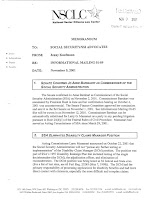From Government Executive:
A bipartisan group of senators on Wednesday reintroduced a bill that would place administrative law judges back in the competitive service, effectively overriding a 2018 executive order.
In July 2018, President Trump signed an executive order moving administrative law judges from the competitive service to the excepted service. At the time, the White House claimed it was necessary to comply with the Lucia v. SEC Supreme Court decision, which found that administrative law judges are “inferior officers” under the Constitution, limiting their authority.
The order shifted the method for hiring new administrative law judges. Previously, candidates' qualifications were vetted by the Office of Personnel Management before they were forwarded to agencies for final selection, but the order changed their selection to a more traditional presidential appointment process. ...
On Wednesday, Sens. Maria Cantwell, D-Wash., and Susan Collins, R-Maine, reintroduced the ALJ Competitive Service Restoration Act (S. 2348) to reverse the Trump administration’s executive order and restore administrative law judges to the competitive service. The lawmakers first introduced the bill in August 2018, but Congress did not act on the measure. ...








